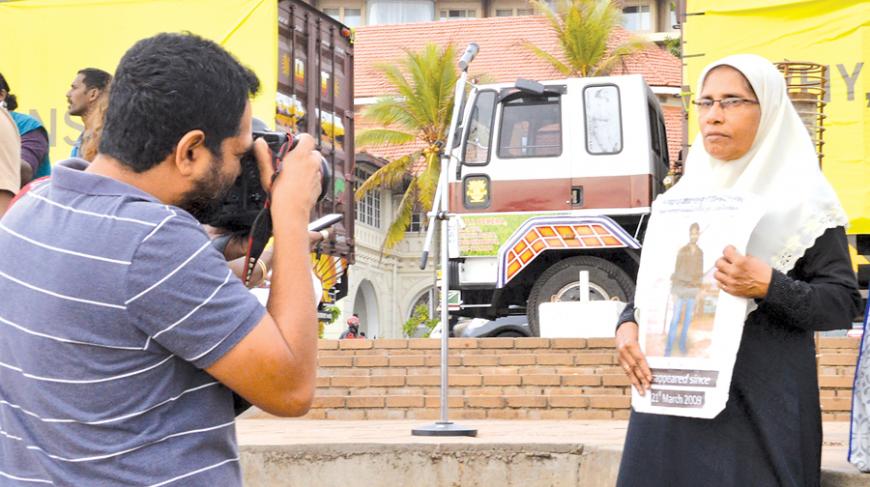
The worn out placard she was holding, as she stood silently deep in thought by a stairway leading to the Galle Face Green, depicted a picture of a young man. Slowly wiping tears rolling down her face with a handkerchief, she gazed past the gathered crowd at the sea reflecting the setting sun- end of another day.
Most of the people who were at the ocean-side urban park in the heart of Colombo, that day (August 28), flew kites, among them were a dozen plain yellow kites symbolising the lost ones, flying high next to the vibrant multi-coloured ones.
That was not just another day for mothers like Siththy Jameena, 56, from Mattakkuliya. It was another ray of hope that someday soon they will get the desperately needed and much delayed answers. The placard Jameena was holding depicted her second son Mohamed Hakeem’s photograph. Jameena is still searching for Hakeem who went missing in March 2009 when he was just 22 years old. Though she seemed forlorn, Jameena is not alone in her struggles.
She was one of the participants at the solidarity protest organised by the human rights group Amnesty International. The event, which commenced ahead of International Day of the Disappeared on Thursday (30), saw human rights activists and family members of victims of enforced disappearances from countries such as Pakistan, Nepal, Maldives and Bangladesh. The yellow kites were flown to mark the event.
Three containers bearing banners reading ‘More than 60,000 Disappeared.’, ‘Still No Answers.’ and ‘Why, Mr. President?’made their way around Colombo before stopping in front of the urban park where the official event kicked-off. The containers travelled to the South the next day (29) and to the North the day after, both areas where a large number of persons went missing or disappeared leaving devastated families behind.
“Disappearances are a tool of terror that strikes not just individuals or families, but entire societies,” Amnesty International declared in a statement. “This is why they are a crime under international law, and if committed as part of a widespread or systematic attack, they constitute a crime against humanity.” The statement further read that in Sri Lanka justice is denied to nearly 100,000 families as it suffers from enforced disappearances of at least 60,000 and as many as 100,000 persons since the 1980s.
 Sandhya Ekneligoda - still seeking justice |
The cases include youth from the Sinhala community who were killed or forcibly disappeared by the state on the notion that they had links to the left in 1989 and 1990, Tamils who were suspected to be linked to the LTTE and disappeared by the police, military and paramilitary operatives from 1983 to 2009, and human rights defenders, aid workers, journalists, government critics, and prominent community leaders.
“Despite international commitments to end impunity for enforced disappearance, the authorities,” Amnesty International adds, “have failed to investigate these cases, identify the whereabouts or fate of the victim, or prosecute those suspected of the crimes.”
Resonating these words, a street drama was performed by a group of local artistes, at the event in Galle Face Green, showcasing the plight of a woman searching for her missing husband but was let down by the higher authorities she looked up to who branded her selfish for putting her family before the country.
Among the attendees at the event was Amina Masood Janjua, Chairperson of Defence of Human Rights Pakistan (a rights group), who is also searching for her educator and businessman husband Masood who disappeared in July 2015.
Speaking to the Sunday Observer, she said that there are many similarities between the enforced disappearance cases in Sri Lanka and Pakistan. “The kind of abduction that took place in Pakistan and Sri Lanka are the same, and the military is most probably behind most of these cases,” she said.
Janjua pointed out that she saw Sri Lanka heading towards a better future when she agreed with UN resolutions, but sadly at the ground level the situation remains grim.
“Sri Lanka shows an impression of doing something regarding the issue but actually failed in it. Victims remain uncompensated and in psychological trauma waiting till their files to be closed,” she says. “I see much older women waiting nearly 30 years for answers. We do not have that in Pakistan. These women still have hope that they will get justice. They should be given a peaceful resolution.”
A silent demonstration was also held by a group of Maldivian activists and family members of journo Ahmed Rilwan four years ago. The group displayed slogans urging for justice to be served.
A young woman from Nepal shared the story of her sister who was abducted by the national army, while she was on her way to the hospital. As she broke down in tears Rilwan’s sister consoled her with a knowing embrace. The loved ones who awaited the return of a family member knows too well the anguish of aimlessly waiting for answers. “Everywhere in the world we share the same stories, same sadness. Only the state bodies can solve this issue,” said Sandya Ekneligoda, the wife of missing journalist Prageeth Ekneligoda urging people from the South, North and East to come together and let their voices be heard till justice is served.
The kites were still flying high when the event came to an end, with the street performers singing Danga Gei DaduwamSiyumali Wadi Nam by Vijaya Kumaratunge.
Jameena whose son was allegedly abducted by the Sri Lanka Army as he was driving his three-wheeler with a Tamil passenger is hopeful that Hakeen would someday return to their family which includes his child born a few months after he disappeared. Though she has aged and is feeble Jameena attends every event such as this desperately calling out for answers
Pix by Saman Mendis
